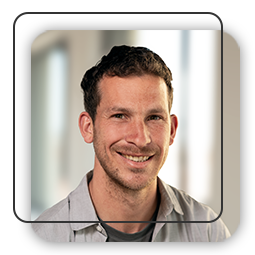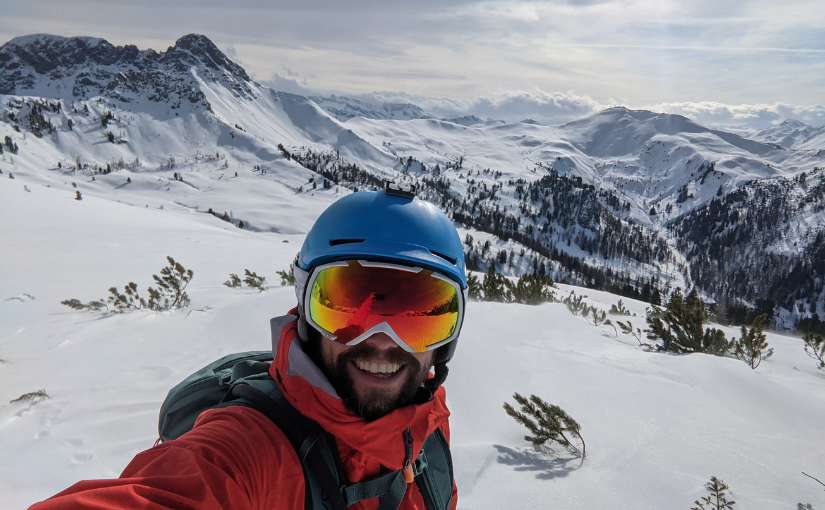Marius, most people know you as the CEO of hotelkit and hotelier. What are your hobbies and your private interests?
As a father of two kids, I naturally spend a lot of time with my family. Besides that, I make sure to keep physically fit, and I am interested in a wide range of sports. I especially enjoy outdoor exercise, be it ski touring and skiing in the winter, or mountain biking, hiking and running in the summer – all of these bring me great joy.
What did your professional life look like before hotelkit?
The thought of being self-employed was always appealing to me, but getting there was a long journey. During my studies in Innsbruck, I tried my luck at my very first project: an online guide for ski lodges. At the time, it was not exactly an economic success, but instead, I got to meet the soon-to-be co-founders of hotelkit.
As other attempts, such as an online student community and an online travel guide, failed as well, I returned to Salzburg and decided to take over the hotel Der Salzburger Hof owned by my parents. Suddenly, I was confronted with all the challenges that were involved in managing the hotel’s daily activities. In particular, the communication nightmare that comes in the form of the “hotel operations manual” – also jokingly called the “monster file”. There was also the unfavorable and inefficient shift-handover book to be dealt with. As a solution-oriented person, I no longer wanted to accept this. So, shortly afterwards, we developed – at first for our own personal use – an intranet based on an open-source solution that made communication and knowledge management possible through a Wikipedia and blogging function.
After three unsuccessful attempts to gain ground in the software industry, I decided to take over the hotel of my parents “Der Salzburger Hof”. Suddenly, I was confronted with the everyday challenges of running a hotel. My goal was to find a digital solution. Based on an open-source-product, we developed an intranet which enabled knowledge management and communication in a digital way.
How did it eventually come to the foundation of hotelkit?
Around the same time, I founded an association with a number of other owners of privately owned city hotels called the PrivateCityHotels. This way, similarly to chain hotels, our employees had the possibility of working in a different company for a certain period of time. This is how Gera Bachner – back then front office manager at Der Salzburger Hof, later first employee of hotelkit and today, after maternity leave, quality & project manager at hotelkit – spent a week at the Hotel Victoria in Nuremberg. There, they were impressed by the fact that Gera could follow the workflow in Salzburg through the newly implemented tool, despite being miles away. Sabine Powels, managing director at Hotel Victoria, also wanted an efficient and intelligent solution for her hotel, just like this one. In conversation with other hoteliers, I then found out that many of them were interested in a kind of digital collaborative platform. At that moment, it became clear to me that what I had thought was only going to be for internal use at Der Salzburger Hof, actually had the potential to solve the challenges of the entire industry. I contacted the software specialists that I had met during my time in Tyrol. To cut a long story short: the project hotelkit was born.
In conversation with other hoteliers, I found out that many of them were interested in a kind of digital collaborative platform. It became clear to me that what I had thought was only going to be for the internal use at “Der Salzburger Hof”, actually had the potential to solve the challenges of the entire industry. The project hotelkit was born.
You are the managing director of the hotel Der Salzburg Hof and founder and CEO of hotelkit GmbH. What does your leadership style look like?
After one year of coming to a standstill, we were finally able to resume our economic growth from 2018 and 2019 in 2021, and now the company has more than 80 employees. Of course, this affected my leadership style. In the past, I was actively involved in the departments marketing, product, and sales. Now, I try to work more and more on the company, instead of working in the company.
Furthermore, there is now another hierarchical level: the team-leads. These are personalities with outstanding talents and leadership qualities that set an example for the other employees. This way, many of our young team members have – for the first time – taken on a management position within our company. However, this does not reduce my trust in any way. On the contrary, no one is in his/her position unjustly. Hire for attitude, train for skills – this has always been my guiding principle when it comes to hiring, and I can tell you, it pays off. Our team is full of young and motivated talents, and the bond is almost like family. I now consider myself a sparring partner, who discovers, supports, advises and furthers talents.
Hire for attitude, train for skills – this has always been my guiding principle when it comes to hiring, and I can tell you, it pays off. Our team is full of young and motivated talents, and the bond is almost like family.
Generally, I would describe my leadership style as “participative”. I am not one to force my ideas by hook or by crook and without hearing the opinions of others. Coming up with a solution together is important to me and for a project to succeed, the input of the team is really important. Moreover, I want to give my employees as much freedom in their domains as possible. In this context, I like to use the allegory of the freeway: it offers a lot of space to move around, but at the same time this movement is enclosed by the guardrail and all the traffic flows in the same direction. Together we achieve more, this is not only the philosophy of our company but also of our software hotelkit.
How did you experience the corona crisis and how did your company make it through this difficult time?
Corona hit us just as we were making a decisive breakthrough in the market. We calculated a growth of 70 % for 2020 and had enlarged our team to manage these challenges. However, being financed entirely from own resources, we were operating at the limit, not only in terms of work load but also in terms of liquidity. So to say, the pandemic cut the ground from under our feet. Suddenly, I was confronted with this unusual situation of being forced to watch helplessly and not being able to intervene creatively in any way. It is only natural to lose hope when faced with a hopeless situation like this one. Therefore, it was important to me to find out, where the boundaries of my scope of action lie. It does not make a lot of sense to struggle with the same problems all day long. This is why I decided to work out a fixed daily schedule, where I dedicated specific time periods for sports and relaxation.
Ultimately, my focus loosened from the rigid concentration on this supposedly hopeless situation. Instead, I realized little by little that our product had enormous potential – even in the middle of a crisis. The hotels were closed and the teams were on short-time. Our digital collaborative platform hotelkit is the ideal solution to make team spirit possible despite physical distance. We were able to successfully communicate this message to our clients. As hotels opened up again and hygiene became a priority like never before, we succeeded in communicating the advantages of hotelkit as an adaptable and transparent digital knowledge platform, where the constantly changing regulations are integrated almost at the push of a button and can be easily retrieved. Our second product medikit, a digital collaborative platform for medical organizations, achieved a real train of success during the corona crisis as doctor’s practices, clinics, pharmacies and nursing homes also recognized the advantages of digital communication and process management. Within a short time, we designed a bed management solution for the Salzburger Landeskrankenhaus. This way, we made an important contribution towards resolving the organizational effort during the pandemic.
Corona cut the ground from under our feet, but we managed, to focus on the positive again and saw the potential of our product to solve problems of the crisis.
Also, within the company everything took a turn for the better. After the work-intensive period of growth, there was suddenly time to breathe deeply. Because of the decreasing capacity utilization in all domains, we registered our employees for short-time work, and I am very grateful to the Austrian State for this funding. At the same time, this breather gave us the possibility to take a long overdue step and adapt the internal organizational structure to the size of the company. That was important because by doing so, we created a solid foundation for our upcoming growth. At the end of the day, the crisis has proved that digital communication is not only modern, efficient and can be used from anywhere, but it also makes cooperation in times of a crisis possible. More and more companies realize this, and this is why I look positively into the future of our company.
The subject of New Work becomes more and more important. hotekit as a platform for digital communication and collaboration supports this approach strongly. To what extent do you believe that this way of working is possible in the hospitality industry?
Of course, New Work is also in the hospitality industry a very modern and relevant subject. A change in mindset is needed to make this unique sector attractive again for future employees. When people think of New Work, they think of flexible work hours and home office. In a hotel, this is of course only partly possible. Nevertheless, there are also employees working in the back office. So why shouldn’t they be able to work from home on some days?
In other domains such as front office, breakfast service and housekeeping, home office is not really an option. However, there is still a lot of potential here to organize the workspace in a more attractive way. The first thing that comes to mind is a working method that is inefficient and at the same time paper intensive, which is still common in many hotels. Through digital solutions such as hotelkit, the workload can be reduced considerably, and the quality of the collaboration can be optimized. There is also room for improvement when it comes to the work schedules, which are often communicated at short notice. Why not meet the employees halfway and communicate the work schedules further in advance? Moreover, the role of the front office manager can certainly be laid out in a more modern way. For routine procedures, like the check-in, there is already a self-service check-in available and the employees can instead take care of the client’s individual requests and carry out their role as host. In my opinion, team building events are important for strengthening the team spirit amongst the employees, as well as for identification with the workplace. It is also no secret that the salaries in the hospitality industry are often not appropriate for the services that are provided there.
It has to be our goal to establish the idea of New Work in the hospitality industry. There is big potential to improve everyday working-life of employees.
You are the type of person that can never stand still and is always on the lookout for a new adventure. What are your next projects and your plans for the future?
On a professional level, things will remain exciting in the future. With medikit, a digital collaborative platform for doctor’s practices, pharmacies and clinics, we are currently succeeding in convincing more and more big hospitals and nursing homes of our solution. Our expertise in the hospitality industry comes in handy here as well, as the role of the patient in a hospital becomes more and more similar to the role of a hotel guest. I am also curious to see how my role as managing director will evolve over time. In the near future, our company is going to exceed the number of 100 employees. I am looking forward to this new challenge.
In my personal life, I will continue to do my best to find a balance between my job, my family life and being there for my daughters. I also want to keep fit, and not just because of private reasons. To loosen up the work day, we have a mini ping pong table at the office, which is a great method to stimulate creative ideas. But since our team has grown significantly and there are more and more great ping pong players amongst our employees, the formerly enjoyable pastime has turned into a still friendly but quite ambitious competition for the ping pong crown here at hotelkit, which peaks at the yearly tournament at our team event. As a competitive person, I claim this trophy, which motivates me additionally in my sporting ambitions 🙂
Quick questions at the end:
The last app you downloaded?
A: Green Pass
Android or IOS?
A: Android
Instagram, Facebook or LinkedIn?
A: LinkedIn
3 things you would take to a deserted island.
A: A good book, my smartphone and a table tennis table, in case there was someone else there after all.
Your last hike was on which mountain and how long did it take?
A: On Gaisberg close to Salzburg, about 2 hours.
As soon as it is possible to travel again, where will your next trip be going to?
A: Norway
Online-check-in or reception?
A: Professionally online check-in, privately reception.
Coffee or tea?
A: Coffee
Are you interested in a solution whose inventor knows about the problems of the industry first-hand?

About the author
Michael Santner
Narratives about impoverished poets during his studies encouraged him to follow his passion in a secure job. In hotelkits marketing he takes care of packing the numerous ideas of his colleagues into exciting stories.





